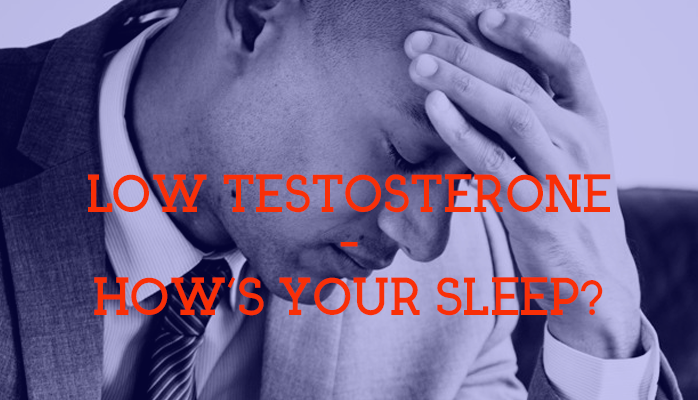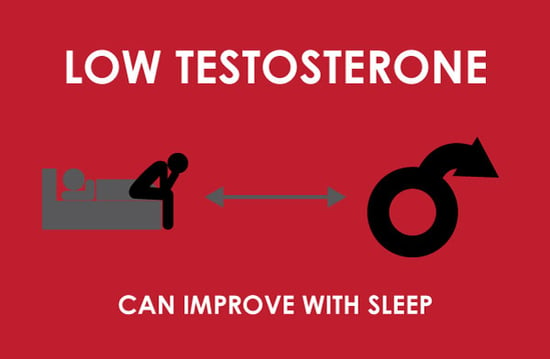
If sleep is being sacrificed on a consistent basis, it's likely that individual is suffering from weariness and reduced alertness. Extreme fatigue may also lead to irritability, depression, headaches, loss of appetite, and the development of more serious health issues. However, many don't speculate that their lack of sleep may be causing low testosterone. In fact, new studies show that poor sleep may be directly linked to lowered levels of testosterone in men.
In a study by the National Heart, Lung, and Blood Institute, losing sleep can impact testosterone in as little as one week. Like with many simultaneously occurring conditions, there is a comorbidity that exists between fatigue and hormone levels. There is little doubt, however, that sacrificing sleep has the ability to cause a drop in testosterone levels.
Evidence Linking Sleep and Testosterone Levels
In 2011, the Journal of the American Medical Association published a report stating that men who slept less than five hours per night for a week had much lower levels of testosterone compared to when they were getting the recommended number of hours per sleep at night. Reduced testosterone levels has noticeable impacts in the areas of sexual behavior and reproduction.
Eve Van Cauter, PhD and professor in medicine who directed the above mentioned study, said, "Low testosterone levels are associated with reduced well-being and vigor, which may also occur as a consequence of sleep loss."
Specifically, the results of the study that Van Cauter conducted showed that testosterone levels in ten young men were decreased by 10-15% after only a week of deprived sleep. These men, age 24 on average and all in good health, reported that their mood and vigor levels declined as each day of the study progressed.
The Importance of Testosterone
A major reason why testosterone levels may drop so significantly as a result of sacrificed sleep may be due to the fact that most natural testosterone is produced while snoozing. An individual must enter rapid eye movement (REM) sleep in order to make a healthy amount of testosterone. The average person gets three to five REM episodes resulting in peaking testosterone production. The resulting effect of surrendered sleep, therefore, is less REM and less testosterone.
Defined by Medical News Today, testosterone is the key male sex hormone that "regulates fertility, muscle mass, fat distribution, and red blood cell production." It's in charge of the development of male sexual characteristics that trigger necessary changes in men as the human body develops.
If a man has low testosterone, he may be exhibiting the following signs and symptoms:
- Erectile dysfunction
- Hair loss
- Hot flashes
- Reduced bone mass
- Reduced muscle mass
- Reduced testicle size
- Reduced amount of semen
- Increase in body fat
- Increase in mood swings
- Infertility
How to Encourage Better Sleep

If a man is finding that he is exhibiting symptoms of low testosterone and suspects that a lack of sleep may be to blame, there are changes he can make to reverse the process. By taking conscious steps towards improving sleep at night, it's possible to positively impact the body's production of testosterone.
Set a constant, specific time to sleep and wake. By doing your best to create a natural pattern that coincides with the light, you can adjust your circadian rhythm and allow your body to get the sleep it needs to function productively and healthily.
Disallow tech in the bed. Artificial blue light emitted by screens actually suppresses melatonin, the sleep hormone, and keeps the brain alert. By ridding your sleeping space of phones and computers, your body will fall into a relaxed state of natural sleep.
Avoid alcohol and caffeine at night. These stimulants impact sleep quality and can play a part in reducing an individual's ability to maintain constant levels of slumber. As a result, they can lead to unnatural nocturnal awakenings.
Do not engage in rigorous activity before sleep. If your body is set to high gear before your head hits the pillow, the central nervous system will stimulate and disallow you from falling asleep. Instead, make a point to partake in a calming activity such as reading.
Reduce stress as best you can. Increased stress directly impacts quality of sleep and increases cortisol which blocks the effects of testosterone. To manage stress, try mediation, yoga, visualization, or other techniques that reduce anxiety.
When to Seek Help from a Sleep Specialist
There's a chance that taking steps on your own might not be enough to combat problems with sleep. If you or someone you know is struggling with getting sufficient amounts of sleep at night, it might be time to seek help from a sleep specialist.
Insomnia, sleep apnea, and other sleep disorders impact more than 40 million Americans. Because poor sleep is directly linked with low testosterone, it's essential for men who suspect that they may have a sleep disorder to seek professional help.
At the Anchorage Sleep Center, we offer a variety of sleep solutions for individuals who have conditions preventing them from getting a quality night's rest. Send us a message to set up your first consultation or email us directly at info@ancsleep.com.

